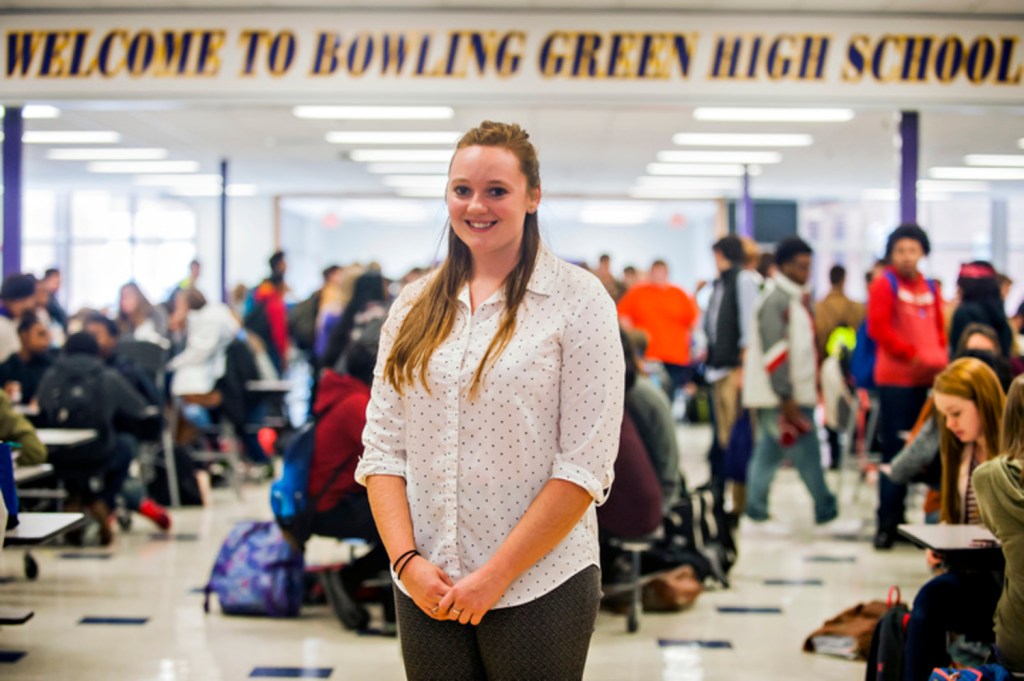Teacher education program sees success by placing teachers in classrooms sooner
Published 9:04 pm Friday, January 6, 2017

- Photos by Bac Totrong/photo@bgdailynews.com Above and top: Recent Western Kentucky University graduate and Bowling Green High School English teacher Rachel Swift works with students Friday at the school. Swift was a product of WKU's Clinical Experiences and Practices in Teaching program.
When Rachel Swift was studying to be a teacher at Western Kentucky University, she jumped at the chance to get in front of a classroom as soon as she could.
Now, as a recently hired English teacher at Bowling Green High School, Swift credits WKU’s Clinical Experiences and Practices in Teaching program for giving her an edge.
“It gives you so much of a leg up with student teaching,” Swift said. “It helps people who think that they want to go into teaching but aren’t sure. You find out in CEPT.”
The project began in 2013 following approval from the Kentucky Council on Postsecondary Education of a $500,000 grant. Organizers in WKU’s College of Education and Behavioral Sciences and the Potter College of Arts and Letters used the grant to partner with Bowling Green High School and Franklin-Simpson High School. They set out with wide-ranging goals, such as merging theoretical teaching approaches with real-world experience, improving WKU’s teacher preparation curriculum and creating higher quality teachers for students.
To accomplish those goals, the CEPT program gives students a more clinical experience by placing them in classrooms sooner than conventional student teachers.
“They’re out in the schools two full days a week for a full year, and then they do their student teaching,” said Sam Evans, dean of the College of Education and Behavioral Sciences.
The program’s instruction happens on site at one of the two participating high schools, allowing students to go from a lesson to observing a classroom or even teaching their own class, Evans said. It hones in on preparing social studies and English teacher candidates.
Swift, who’s now teaching advanced ninth-graders and standard 10th-graders, said she can’t imagine going into her student teaching experience without the prior exposure the CEPT program gave her.
“I love that you can get in front of the classrooms a lot earlier,” she said, adding it helped her learn to manage classrooms and write lesson plans.
Philip Russell, who teaches freshman English at BGHS, experienced the conventional teaching program before going into CEPT, which gave him some perspective.
“Having a consistent presence in the classroom through the CEPT program brought about the feel of teaching better than the traditional program,” he said.
Instead of a laser focus on teacher theory, Russell said the program helped him learn what teaching is like. Now Russell realizes that his teaching day won’t always go the way he anticipated and that he needs to adjust to that.
“It’s a program that needs to be spreading to our different state schools,” Russell said.
Along with WKU, the University of Louisville and Eastern Kentucky University also received grants. However, WKU stood out as the only school that decided to work with high schools rather than middle schools.
Sylvia Dietrich, director of WKU’s School of Teacher Education, said the program helps aspiring teachers learn to make instructional decisions while also giving them feedback from professionals about how they’re doing. Dietrich said the program can be eye opening for some students, who learn that they don’t want to teach after all.
“They really come to terms with what it means to be a teacher and what it means to be a part of a professional community,” Dietrich said. “They are solidly grounded and they know that this is what they want to do.”
The program is paying off for BGHS too, according to Principal William King. He said the school has hired five CEPT students as teachers and “They’ve turned out to be rock stars.”
“We’re finding that these teachers that go through this program are way ahead of those that come out of other teaching programs around the state,” King said.
— Follow education reporter Aaron Mudd on Twitter @BGDN_edbeat or visit bgdailynews.com.





